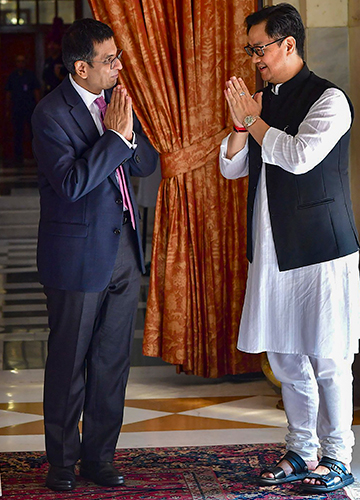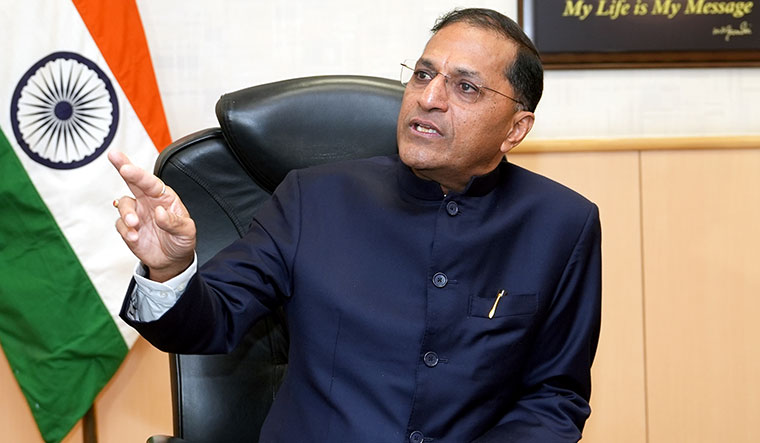How appointments would be made to two crucial Constitutional institutions―the higher judiciary and the Election Commission―was at the centre of some of the most engrossing discussions in the Constituent Assembly as it drafted the Constitution. The debates dealt with the correlation between the method used to appoint these officials and the impact this might have on their independence and impartiality.
The Constituent Assembly did debate whether the judiciary should be given primacy regarding the appointment of judges and whether it should initiate the process rather than the executive. Members emphasised the need to preserve the independence of the judiciary by insulating the process from political influences. Ultimately, the Constituent Assembly rejected the proposal.
It stated, under Article 124(2) of the Constitution: “Every Judge of the Supreme Court shall be appointed by the President by warrant under his hand and seal after consultation with such of the Judges of the Supreme Court and of the High Courts in the States as the President may deem necessary for the purpose and shall hold office until he attains the age of sixty five years: Provided that in the case of appointment of a Judge other than the Chief Justice, the Chief Justice of India shall always be consulted.”
As for the Election Commission, the Constituent Assembly had discussed ways to preserve the independence of elections from interference by the executive. According to the original draft of the Constitution, the Chief Election Commissioner and the election commissioners were to be appointed by the President. Members of the assembly voiced their concerns over giving the government the sole say in the choice of the CEC. The draft was eventually amended to read, as under Article 324(2) of the Constitution: “The Election Commission shall consist of the CEC and such number of other election commissioners, if any, as the President may from time to time fix... and the appointment of CEC and other election commissioners shall, subject to the provisions of any law made in that behalf by Parliament, be made by the President.”
The concerns of the 1940s have now returned amid tensions between the judiciary and the government. The Supreme Court recently heard cases relating to these appointments, and the sticking point is whether the system in place needs change.
At the centre of the debate over appointment of judges is the collegium system, which has been criticised for lack of transparency. It has often been described as a procedure of judges appointing judges, but its defenders say the process protects the independence of the judiciary.
Union Law Minister Kiren Rijiju, in a recent media interaction, asked: “You tell me under which provision [of the Constitution] the collegium system has been prescribed.” He added that it was alien to the Constitution and that, prior to 1993, the government appointed all judges.
Critics of the collegium system point out that Article 124 of the Constitution, which deals with appointment of judges, does not include the word ‘collegium’. What has been debated is whether the Supreme Court, through the judgments in the Second Judges Case (1993) and the Third Judges Case (1998)―which institutionalised the collegium system―indulged in over-reach and gave to itself a function that was not originally, in the Constitutional scheme, a part of its jurisdiction.
In 2014, the Narendra Modi government’s first legislation was meant to create the National Judicial Appointments Commission (NJAC), which would have three judges, the law minister and two eminent persons. The Supreme Court struck it down in 2015, saying that it posed a threat to the independence of the judiciary. In a recent hearing, the Supreme Court observed that the government was sitting on appointments to the higher courts because it was not happy that the court had struck down the NJAC.
“The honourable law minister is completely wrong,” said senior advocate and former Additional Solicitor General Bishwajit Bhattacharyya. “The collegium is very much Constitutional. The Government of India had lost the case (NJAC) before the Supreme Court on October 16, 2015. It does not behove a high functionary of the government, least of all the law minister, to make such remarks.” Bhattacharyya was one of the petitioners who had challenged the Constitutionality of the NJAC before the apex court.
Former Chief Justice of the Allahabad High Court Justice Govind Mathur, however, says that while it would not be appropriate to call the collegium system unconstitutional, he thinks that the system is neither apt nor in consonance with the Constitutional intent. “Chapter IV of part III of the Constitution does not prescribe any administrative work of the Supreme Court,” he said. “The intent was to keep Supreme Court judges involved in their judicial work without any administrative stress. Our Constitution demands only consultation by the President of India with the Chief Justice of the Supreme Court and certain other authorities. By a judgment, this consultation has been made concurrence of the Supreme Court. A good number of judges who are supposed to remain busy with judicial work are carrying the stress of making appointments of judges to Constitutional courts, which is certainly a work that demands huge time and energy.”
Mathur said that a fair method of appointment could entail not involving Supreme Court judges except the CJI. “In fact, the collegium system is causing several serious ailments to the judicial system, including delay in appointments and delay in justice delivery,” he said. “I hope Parliament reconsiders the entire issue and comes up with a fair mode of appointment.”
As for the Election Commission, the apex court has reserved for judgment a petition seeking the constitution of an independent committee for appointing commissioners. The petitioners have pointed out that the Constitution asks the Parliament to pass a law institutionalising the procedure for appointment of ECs, but it has not been done. They also say that the current system of appointments is unconstitutional and that by giving the executive the sole discretion in the appointment process, the system is made vulnerable to manipulation and partisanship. This becomes significant as questions have been raised about the commission’s impartiality, especially in the past few years.
“There is no doubt that to ensure the purity of the election process, it was thought by our Constitution-makers that the responsibility to hold free and fair elections should be entrusted to an independent body insulated from political and/or executive interference,” reads the petition filed by the Association for Democratic Reforms.
The court observed during the hearing that the government was only paying lip service to the concept of independence of the ECs, and suggested that including the CJI in the selection process could ensure that the commissioners are appointed in an impartial and independent manner.
The Centre’s contention, as spelt out in the court, is that the current system is in keeping with the Constitution. It also said that the issue of whether a law should be framed for appointment of the ECs is a matter of policy that lies in the exclusive domain of the legislature.
Mathur says that if an appointment to the EC is not in accordance with the norms or has been made in a malicious or unfair manner, it can certainly be set aside by the Constitutional courts, but it would not be appropriate to provide a different method of appointment by the Supreme Court beyond what is provided for in the Constitution.
Bhattacharyya, however, said, “The authority of the judiciary to interpret the Constitution reigns supreme. Parliament can enact and amend laws, but whether they are in keeping with the Constitution is for the Supreme Court to interpret.”
In the midst of the stand-off between the judiciary and the executive, how you view and interpret the Constitution depends on where you stand.



